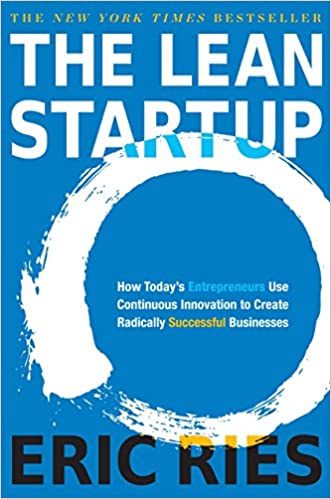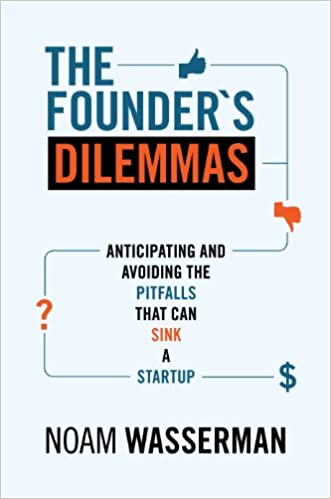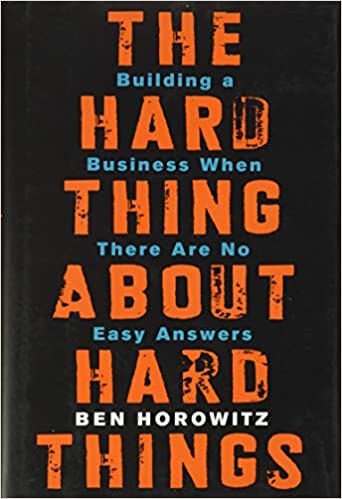You found our list of top startup books.
Startup books are guides to launching and growing new businesses. These works cover topics like raising capital, introducing products to market, building a brand, and growing at a sustainable rate. The purpose of these books is to position founders to more effectively manage the stress and challenges of building a business from the ground up and to increase the chances of long term success.
These works are a type of business book and are similar to books on entrepreneurship, small business books and franchise books.
This list includes:
- tech startup books
- business startup books
- startup books for beginners
Here we go!
List of startup books
Here is a list of must-read books on startups to help build and scale businesses from scratch.
1. The Lean Startup: How Today’s Entrepreneurs Use Continuous Innovation to Create Radically Successful Businesses by Eric Ries

The Lean Startup is one of the bestselling tech startup books. The Lean Startup methodology consists of five main principles:
- Entrepreneurs are everywhere
- Entrepreneurship is management
- Validated learning
- Build-Measure-Learn
- Innovative accounting
By following these guidelines, entrepreneurs can conserve costs, operate more effectively, and avoid common pitfalls, all while scaling the company and maximizing the creativity of the staff. The book teachers readers how to form and articulate a vision, test and experiment ideas, adapt to change, and grow sustainably. The Lean Startup is a handbook for building strong startup foundations that help organizations achieve longevity.
Notable Quote: “Success is not delivering a feature; success is learning how to solve the customer’s problem.”
Buy The Lean Startup.
2. Zero to One: Notes on Startups, or How to Build the Future by Peter Thiel and Blake Masters

Zero to One is one of the most popular entrepreneur startup books. Peter Thiel co-founded PayPal and Palantir and launched a profitable VC that invested in top companies like Facebook, and Blake Masters served as COO of Thiel Capital. The authors use this combined expertise and experience to guide founders through the intricacies of the startup world. The central premise of the book is that major startups do not merely reimagine existing ideas, but rather innovate and present entirely new products to market. Zero to One teaches entrepreneurs how to overcome stagnation, create revolutionary technology or concepts, and launch a business that reshapes the business landscape and the world.
Notable Quote: “All failed companies are the same: they failed to escape competition.”
Buy Zero to One.
3. The Startup Checklist: 25 Steps to a Scalable, High-Growth Business by David S. Rose

The Startup Checklist is one of the more comprehensive startup guide books. Serial entrepreneur and investor David S. Rose provides step-by-step instructions and actionable advice for launching and growing a successful startup. The book covers topics like finding a viable business model, networking with other entrepreneurs, navigating the legal and financial systems, building strong teams, and securing funding. The Startup Checklist provides a roadmap for building a business that includes all the most crucial operational elements.
Notable Quote: “In particular, it is crucial at the beginning to distinguish the business concept from the product concept.”
4. High Growth Handbook: Scaling Startups From 10 to 10,000 People by Elad Gil

High Growth Handbook is a playbook for rapidly scaling startups. The book analyzes the evolution of successful, high-growth companies such as Twitter, Google, Stripe, and Airbnb and points out patterns in the behaviors that enable entrepreneurs to expand the company quickly. The handbook covers topics such as recruiting and working with a C-suite, interacting with board members, navigating initial public offerings, and securing late stage funding. High Growth Handbook shows founders how to spur hyper growth without losing control, forgetting the core vision, or sacrificing company culture.
Notable Quote: “All startup advice is only useful in context, and I am a firm believer that the only good generic startup advice is that there is no good generic startup advice.”
Buy High Growth Handbook.
5. Lost and Founder: A Painfully Honest Field Guide to the Startup World by Rand Fishkin

Lost and Founder is one of the best startup books for beginners. Rand Fishkin lays out an honest account of the trials and tribulations of founding and scaling a startup. The book discards the romance of the overnight sensation narrative in favor of the reality that running a successful startup requires years of hard work and mindful strategizing. Chapters come with titles such as “don’t raise money for the wrong reasons or from the wrong people,” or “startups carry their founders’ baggage,” and cover topics such as pivoting, scalable marketing, and launching products at the opportune moment. Lost and Founder presents “startup chat codes,” that are less shortcuts and more self-awareness, research, and filtering through the noise to find the right advice.
Notable Quote: “Growth hacks alone can’t solve all your marketing problems, but the right ones may add immense value to an already humming marketing flywheel.”
Buy Lost and Founder.
6. The Mom Test: How to talk to customers & learn if your business is a good idea when everyone is lying to you by Rob Fitzpatrick

The Mom Test lays out the hypothesis that in the same way mothers will agree with you out of love, many collaborators and bystanders will exaggerate or fib in an effort to show support. Asking others’ opinions outright is not the most reliable method of evaluating ideas. Instead, entrepreneurs must learn how to ask the right questions and find audiences that are likelier to be honest. The Mom Test lays out formulas for avoiding bad data, wording constructive questions, and connecting more authentically with customers. This book is a recipe for cutting through hype and flattery and finding the truths that will help to guide organizational improvements.
Notable Quote: “It boils down to this: you aren’t allowed to tell them what their problem is, and in return, they aren’t allowed to tell you what to build. They own the problem, you own the solution.”
Buy The Mom Test.
7. Lean Analytics: Use Data to Build a Better Startup Faster by Alistair Croll and Benjamin Yoskovitz

Lean Analytics is a guide on using data to inform startup business decisions. By paying attention to numbers, founders can grow startups more quickly. Measurable metrics can help founders accurately gauge the interest and needs of potential clients and monitor consumer behavior. These measurements reveal whether a startup is on track to hit goals or whether a change of course may be necessary. The book explores topics like what makes a good metric, how to analyze data results, and how to use numbers in ways that spark meaningful change. Lean Analytics is a simplified encyclopedia of data analytics as well as an instructional guide for making data-driven entrepreneurial decisions.
Notable Quote: “Don’t just ask questions. Know how the answers to the questions will change your behavior. In other words, draw a line in the sand before you run the survey.”
Buy Lean Analytics.
8. Traction: How Any Startup Can Achieve Explosive Customer Growth by Gabriel Weinberg and Justin Mares

Traction is one of the best business startup books. Having a good idea is not enough to make a startup survive. To last, new companies must progress and catch on with potential customers. Traction as a concept is the measurement of the public accepting a new idea, and Traction the book is a guide to gaining that momentum. The book explains how to set traction goals, measure momentum, maximize media exposure, and turn brand awareness into sales. This guide is comprehensive and covers the full scope of ways to increase visibility, including email marketing, community building, in-person engagements, and paid aids. Traction is a handbook for turning a startup into a household name using practical and sustainable tactics.
Notable Quote: “The only essential thing is growth. Everything else we associate with startups follows from growth.”
Buy Traction.
9. Founders at Work: Stories of Startups’ Early Days by Jessica Livingston

Founders at Work is an anthology of startup beginnings. Following an interview with founders format, the book charts the early days of companies like Tripadvisor, Apple, PayPal, and Yahoo. Jessica Livingston is a cofounder of the famous Y Combinator startup accelerator, and this entrepreneurial expertise shows in the questions she asks the founders. The book reads like a conversation between thought leaders rather than a self-help guide. Nonetheless, Founders at Work is a helpful resource for startups looking to launch, struggling to survive, or aiming to innovate. The book offers a behind-the-scenes look at the scrambling starts that preceded the polished later days of huge companies.
Notable Quote: “Innovations seem inevitable in retrospect, but at the time it’s an uphill battle.”
Buy Founders at Work.
10. The Founder’s Dilemmas: Anticipating and Avoiding the Pitfalls That Can Sink a Startup by Noam Wasserman

The Founder’s Dilemmas explores the issues and tough decisions founders face when establishing startups. The book outlines the common mistakes made by new entrepreneurs and prescribes strategies and tactics to avoid these missteps. Chapters focus around concepts such as determining equity splits or cash compensation, hiring at the right time, and defining roles within the organization. Drawing on anecdotes and data from hundreds of founders, Noam Wasserman gives advice on how to navigate relationships with partners, employees, and investors and how to make decisions that benefit the company long term. The Founder’s Dilemmas is a reference guide for overcoming obstacles and steering startups out of tights spots.
Notable Quote: “A decision made at one point can make a subsequent decision turn out badly, even if that subsequent decision might have turned out well in different circumstances.”
11. Secrets of Sand Hill Road: Venture Capital and How to Get It by Scott Kupor

While most books on startups are written from a founder’s point of view, Secrets of Sand Hill Road shares secrets from a venture capitalist’s perspective. Having experience as both an entrepreneur and a VC, Scott Kupor is in the unique position of being equipped to offer practical funding advice to founders. The book shines a light on VC logic and investment strategy and gives leaders tips on topics like using narrative to persuade backers, preventing VC’s from interfering too heavily in daily operations, and laying the groundwork for sale or acquisition of the organization. Secrets of Sand Hill Road is a masterclass in the fundamentals of funding and is a valuable reference for any startup looking to raise capital.
Notable Quote: “In fact, you’ll often hear VCs say that they like founders who have strong opinions but ones that are weakly held, that is, the ability to incorporate compelling market data and allow it to evolve your product thinking. Have conviction and a well-vetted process, but allow yourself to “pivot” (to invoke one of the great euphemisms in venture capital speak) based on real-world feedback.”
Buy Secrets of Sand Hill Road.
12. Dear Female Founder: 66 Letters of Advice from Women Entrepreneurs Who Have Made $1 Billion in Revenue by Lu Li

Dear Female Founder speaks to the unique challenges and triumphs of launching, running, and growing a startup as a woman. The book collects words of dozens of female entrepreneurs, including philanthropists, venture capitalists, media moguls, and ecommerce entrepreneurs. The sections of the book focus on different stages of the startup journey, from starting, to learning, to reflecting on lessons. Dear Female Founder is an anthology of advice from one generation of female startup leaders to the next.
Notable Quote: “I believe that there is a need to reinvent the experience of startup incubation to address the challenges that women face. I also believe that women are the most under-tapped resource for economic improvement.”
Buy Dear Female Founder.
13. Anything You Want: 40 Lessons for a New Kind of Entrepreneur by Derek Sivers

Anything You Want is one of the best online startup books. Derek Severs started an online CD business in the early 2000’s and went on to sell it for $22 million dollars. His story is a how-to guide on unconventional enterprises. The author advocates for finding and following your own entrepreneurial path instead of following rigid structures and arbitrary conventions. The book champions following your passion, bootstrapping sans traditional funding, and setting your own professional goals instead of striving for an ideal. Severs advises not to stress having a small yet loyal customer base and not to feel shame if your company is a current project instead of your life’s work. Anything You Want offers an alternative to the stereotypical startup narrative that is especially relevant for the internet age.
Notable Quote: “Never forget that absolutely everything you do is for your customers. Make every decision—even decisions about whether to expand the business, raise money, or promote someone—according to what’s best for your customers.”
Buy Anything You Want.
14. The Hard Thing About Hard Things: Building a Business When There Are No Easy Answers by Ben Horowitz

The Hard Thing About Hard Things remains one of the top selling startup books on the market. Entrepreneur and thought leader Ben Horowitz lays out the realities of building a startup and the tough choices that confront CEOs and founders along the way. The book tackles topics such as firing an executive, confronting beloved employees about poor performance, minimizing office politics, and striking a balance between accountability and creativity. The Hard Thing About Hard Things presents practical, firsthand advice about some of the most complicated yet lesser-discussed challenges in the startup world.
Notable Quote: “Spend zero time on what you could have done, and devote all of your time on what you might do.”
Buy The Hard Thing About Hard Things.
Conclusion
Society paints startup founders as revolutionaries who shake up systems and blaze trails into the future. While new companies can indeed have great impact on the world, the path to running a successful startup is nowhere as simple or straightforward as most folks make it out to be. Founding a new business comes with a unique set of challenges, and leaders can often feel lost when trying to figure out the best moves for each situation. Reading books about startups can help prepare ambitious entrepreneurs for the realities of starting and maintaining a brand new enterprise, and can help leaders better navigate the intricacies of innovative industry in the midst of crisis or change.
For more reading, check out these lists of innovation books, marketing books, training and development books, and books on change management.
We also have a list of books on business finance.
